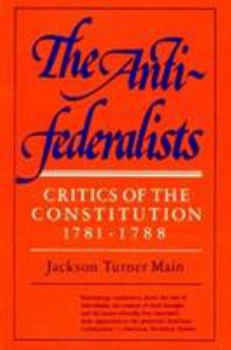The Antifederalists; Critics of the Constitution, 1781-1788: Critics of the Constitution 1781-1788
Select Format
Select Condition 
Book Overview
Examines the backgrounds, theories, policies, actions, and influence of those who opposed adoption of the Constitution.
Format:Paperback
Language:English
ISBN:039300760X
ISBN13:9780393007602
Release Date:January 1974
Publisher:W. W. Norton & Company
Length:308 Pages
Weight:0.68 lbs.
Dimensions:0.8" x 5.1" x 7.7"
Related Subjects
19th Century Constitutional Law History Law Political Science Politics & Social SciencesCustomer Reviews
2 ratings
What's wrong with the Constituion
Published by Thriftbooks.com User , 15 years ago
This book has changed my perspective on the Constitution. The Anti-Federalists opposed the Constitution because they felt the document would not create a federal style of government. One particular objection they had was the ambiguity of the wording in the Constitution. An Anti-Federalist from Maine wrote, "There is a certain darkness, duplicity and studied ambiguity of expression running through the whole Constitution...As it now stands but very few individuals do or ever will understand it. Such extensive undefined powers over the lives and properties of the citizens are capable of being interpreted to answer the most ambitious and arbitrary purposes." Thank God that hasn't happend! This book has made me question the changes the Constitution wrought in the government of our country. Perhaps the wiser course of action would have been to simply amend the Articles of Confederation.
Understand how our Founders argued the Constitution
Published by Thriftbooks.com User , 17 years ago
This was required reading for a graduate course in the Humanities. Jackson Turner Main's's book illustrates how political discourse became contentious once Americans started to debate the formation of a national government. To illustrate the use of pseudonyms by American founders to make their political points, it is necessary to match up some pseudonyms to their authors and examine why the pseudonym was used. Since Cato's Letters made such an impression on Americans, the use of the pseudonym "Cato" will be examined first. During the debates to ratify the U. S. Constitution in the 1780's, several political leaders relied on a well known group of Roman personages and used them as pseudonyms to argue either for or against ratification of the Constitution. The group of politicians arguing against ratification was known as the Antifederalists. Their leading standard-bearer was George Clinton who served as governor of New York from 1777 to 1795, and wrote newspaper editorials under the pseudonym "Cato." "Cato" along with other Antifederalists writing under such pseudonyms as "Agrippa" and "Brutus" vociferously argued in their writings against ratification of the Constitution because they believed it put too much power in the hands of the federal government and left little power to the states. Perceiving that citizens would fear the tyranny of the few, at the federal level the Antifederalists argued for more governmental power to devolve to locally elected representatives at the state level, where citizens would have greater influence on government and law making policy. Classically educated Citizens who saw the names "Cato," "Agrippa," and "Brutus" associated with Antifederalism, instantly recognize that the group's political sentiments stand for defending republican ideals through virtue and morality in government and against the tyranny of the privileged few. As a graduate student in philosophy and history, I recommended this book for anyone interested in early American history, philosophy, education, the humanities.





